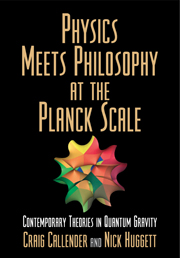Book contents
- Frontmatter
- Contents
- Preface
- 1 Introduction
- Part I Theories of Quantum Gravity and their Philosophical Dimensions
- Part II Strings
- Part III Topological Quantum Field Theory
- Part IV Quantum Gravity and the Interpretation of General Relativity
- Part V Quantum Gravity and the Interpretation of Quantum Mechanics
- 12 Quantum spacetime without observers: Ontological clarity and the conceptual foundations of quantum gravity
- 13 On gravity's role in quantum state reduction
- 14 Why the quantum must yield to gravity
- References
- Notes on contributors
- Index
12 - Quantum spacetime without observers: Ontological clarity and the conceptual foundations of quantum gravity
Published online by Cambridge University Press: 15 December 2009
- Frontmatter
- Contents
- Preface
- 1 Introduction
- Part I Theories of Quantum Gravity and their Philosophical Dimensions
- Part II Strings
- Part III Topological Quantum Field Theory
- Part IV Quantum Gravity and the Interpretation of General Relativity
- Part V Quantum Gravity and the Interpretation of Quantum Mechanics
- 12 Quantum spacetime without observers: Ontological clarity and the conceptual foundations of quantum gravity
- 13 On gravity's role in quantum state reduction
- 14 Why the quantum must yield to gravity
- References
- Notes on contributors
- Index
Summary
Introduction
‘The term “3-geometry” makes sense as well in quantum geometrodynamics as in classical theory. So does superspace. But space-time does not. Give a 3-geometry, and give its time rate of change. That is enough, under typical circumstances to fix the whole time-evolution of the geometry; enough in other words, to determine the entire four-dimensional space-time geometry, provided one is considering the problem in the context of classical physics. In the real world of quantum physics, however, one cannot give both a dynamic variable and its time-rate of change. The principle of complementarity forbids. Given the precise 3-geometry at one instant, one cannot also know at that instant the time-rate of change of the 3-geometry. … The uncertainty principle thus deprives one of any way whatsoever to predict, or even to give meaning to, “the deterministic classical history of space evolving in time”. No prediction of spacetime, therefore no meaning for spacetime, is the verdict of the quantum principle’.
(Misner, Thorne, and Wheeler 1973)One of the few propositions about quantum gravity that most physicists in the field would agree upon, that our notion of spacetime must, at best, be altered considerably in any theory conjoining the basic principles of quantum mechanics with those of general relativity, will be questioned in this chapter. We will argue, in fact, that most, if not all, of the conceptual problems in quantum gravity arise from the sort of thinking on display in the preceding quotation.
Information
- Type
- Chapter
- Information
- Physics Meets Philosophy at the Planck ScaleContemporary Theories in Quantum Gravity, pp. 275 - 289Publisher: Cambridge University PressPrint publication year: 2001
Accessibility standard: Unknown
Why this information is here
This section outlines the accessibility features of this content - including support for screen readers, full keyboard navigation and high-contrast display options. This may not be relevant for you.Accessibility Information
- 24
- Cited by
